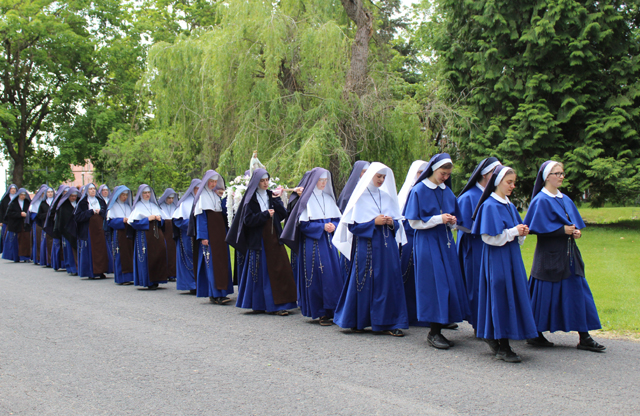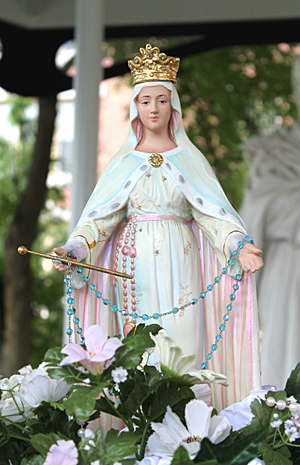CMRI Sisters > Vocations to the Sisterhood
What is a Vocation to the Sisterhood?
We call her “Sister”...Christ calls her “Bride”... She is, like the humble maiden of Nazareth, a virgin-mother, and her name is always “Mary.” Since the dawn of Christianity, the number of consecrated virgins has been legion. Robed in white or black, gray, brown or blue, toiling in the active apostolate or hidden within silent cloister walls, the nun’s mission to the world is singular, unique.
Once a Virgin brought forth, nurtured and served the Savior of the world and became Mother of all the redeemed. In a very real sense, the Sister, too, through her life of consecration, gives nourishment and service to Christ’s members in His Church. This maternal character, then, is one of the most beautiful attributes of the Sister. Whenever a distressed and bereaved humanity has wanted a mother, the Catholic Sister has stepped in as a mother sent by God.
Children have always looked up to her with a mystified wonder, and have sometimes called out: “Mommy, look — it’s Mary!” They were not far from the truth.
In today’s world of confusion and moral breakdown, whole-hearted commitment to spiritual ideals is more rare than the most priceless pearl. Sacred Scripture tells the story of the rich young man who found it too much to sell all he had to follow Jesus. But today, even the not-so-rich young people are ruled by a spirit of materialism and an attachment to modern comforts and conveniences far surpassing those of the wealthy in the time of Christ. Like that rich young man, many a young woman may have observed the commandments from her youth; yet she trembles at the thought of sacrificing a future home and family of her own, a career and social life, the comforts of modern living, and the simple independence of living her own life. Often she may feel only repugnance to such a life of sacrifice. These feelings are perfectly normal. Then, too, she may have to contend with the disapproval of worldly acquaintances, who call the religious life a waste, a useless throwing away of the best things in life.

The Sisters carry the statue of Mary Immaculate Queen in procession on her feastday.
Following the call is a sacrifice. While God does not expect this sacrifice of all, He does gaze upon some souls with a special love, hoping, waiting, expecting.... We must remember that God can choose anyone. He does not necessarily choose a young woman because she is good and pious, but because He is so good, and so infinitely merciful. The Apostles, after all, were rough, uneducated, stubborn men — they were sinners.
Of course, life in the convent is not always easy — but neither, for that matter, is married life. The Sister follows in the footsteps of Jesus more closely than the ordinary Christian. “If thou wilt be perfect, go, sell all thou hast and give to the poor... deny thyself, take up thy cross and follow Me...“ As His bride, she shares in the interests of His Sacred Heart. Like Him, she lives in poverty, simplicity, purity and humility. In union with Him, she sacrifices herself for the salvation of souls. In today's world, where sin and ingratitude crucify Him anew, she is there to offer her love and reparation to console His Sacred Heart as only a spouse can.
Once a woman enters the convent, what can she expect? Can she change her mind after she enters? Yes, a candidate is free to leave at any time during her postulancy and novitiate (approximately her first year-and-a-half.) She is given continual guidance, and when the time arrives, a Sister takes her vows only of her own free will. If she or her superiors feel that she is not meant for the religious life, whether as a postulant or novice, or even after her temporary vows have expired, she is free to leave. Very wisely, the Church wishes to make sure of the resolution of

Mary Immaculate Queen, our Patroness
the candidate while at the same time making certain that she has the physical, mental, and moral qualities which insure a successful vocation.
How does a young woman know whether or not she is called by Christ to be a Sister? No angel will come to announce her vocation. The question of whether one has a vocation to the religious life is often based on the erroneous assumption that such a vocation should be so absolute and clear that there would scarcely be any choice left to the free will once it is given. This, however, is not the case. There are certain absolute conditions for a vocation without which one can be sure that God is not inviting her to enter the convent. Other signs are inherent and dependent upon free will, but inspired by the grace of God as an invitation to follow Him. These are the signs:
Absolutely Necessary Conditions:
1. Good health: As religious life makes demands upon one's physical condition, good health is necessary.
2. Ordinary talents: One must have at least average abilities in order to follow a vocation.
3. Reasonable independence: If one is obliged to care for her parents, for instance, that person is not free to enter the religious state.
4. Normal piety: If one does not have, at minimum, an ordinary devotion to religious practices, it can hardly be expected that she would be fitted for the extraordinary practices of a religious.
Other Signs:
1. A spirit of sacrifice: an ability to give up lesser but more appealing goods for the greater, spiritual ones.
2. A spirit of zeal: that special form of charity that inspires one to think of doing something to save souls.
3. A spirit of detachment: the power that enables a person to be in the world but not of the world, to control the emotions, and if necessary, suppress them. This is absolutely necessary for a vocation to the celibate state.
4. A desire to be a religious, or a conviction that to enter the religious state is the surest way for one to save her soul.
